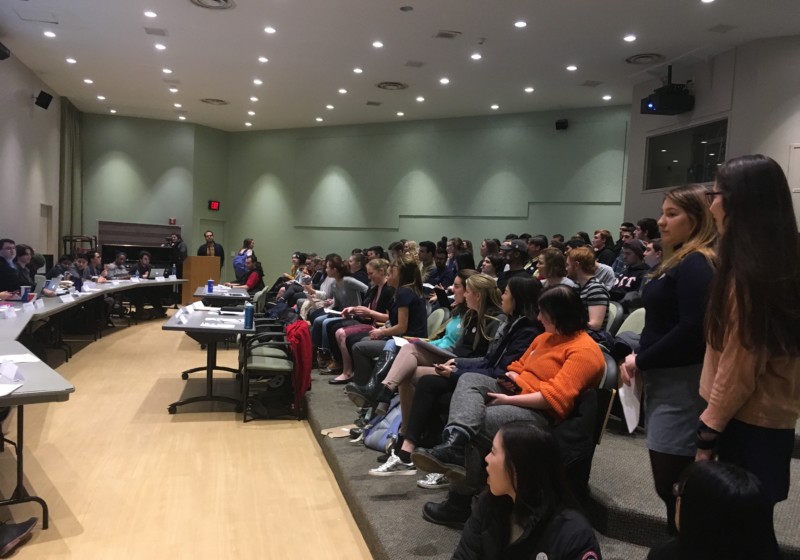A single vote by an SA senator might mean the end for one of the oldest club sports teams on campus.
Senators rejected a motion to exempt the UR Equestrian Team from financial caps at the body’s meeting this past Monday in a move the team said could leave it unable to function.
“I encourage you to look at the members of the gallery and see who is all represented here tonight,” said senior Kelly Tighe, the team’s president, before the vote. “Not allowing exceptions for our budget will cause this club to cease to exist. This sport is the reason I am the person, student, and leader who stands in front of you today.”
Senators voted anonymously — an atypical move — with 11 in favor of exceptions, four opposed, and one abstaining. By the time that vote had been taken, two senators had already left the four-hour meeting. The motion required a two-thirds majority of the entire 18-member Senate, according to leadership, though discrepancies between SA documents leave up to interpretation how clearly that was the case.
In voting down the motion, Senate sided with its appropriations committee, which had argued the saved funds would be better used to pay for uniforms for other teams and to hire a dedicated club sports adviser.
“We want to make sure all the money being spent […] benefits all the students,” said senior CJ Van Huben, treasurer of the appropriations committee, which handles subsidies for student clubs.
During the meeting, members of the Equestrian Team pleaded with senators, some breaking into tears after the final vote tally — which spurred chatter in the room about losing faith in SA Government.
“Taking this money away from the students, why would you do that?” asked sophomore Maria Favella, who found solace from domestic violence in the team. “We paid for this. It’s very insulting and angering to all the people who have been in my position and need this.”
The room, at one point nearly 30 people over fire code, attracted over 100 students, parents, and community members, an unusually high turnout. Guests were forced to stand along the walls and sit on the floor.
In pre-voting discussions, many senators supported some form of an exception for the team.
“I can’t be against something that no one in the student body is against,” junior Senator Beatriz Gil said, adding later, “As much as I understand that it is a lot of money, they have never turned down someone because of the money, and as much as I think that uniforms might be important, I think that keeping 36, 35 people that are in a club that are so passionate about it is more important.”
Sophomore Senator Leif Johansen spoke similarly of the impending vote.
“20 years from now, the people from Equestrian are going to remember how that changed their life,” he said. “And they’re going to remember their time on the team. And they’re going to remember the people who took that away from them.”
Many expressed their difficulty with the decision.
Senior Alex Guerrero, chair of the Administration and Review Committee, which manages clubs, spoke of past hard calls that needed to be made.
“Passion is only one metric by which to evaluate,” he said after explaining his experience in his role.
Sophomore Senator Jamal Holtz said that uniforms are important to some students and that shouldn’t be discounted. Classmate Senator Tayfun Sahin expressed concerns about how sustainable it would be for Senate to bail the team out in future years.
Van Huben, in a Q&A period during the meeting, repeated how hard the decision was.
“I’m not enjoying doing this,” he said.
The Equestrian Club was founded in 1992, making it older than over 30 other club sports teams. The team does not require its members to compete, but many do, and they regularly compete with varsity teams from schools like Cornell University and Alfred University. Currently, five riders have qualified for the regional competition, including one — co-captain Courtney Herms — who qualified at the highest level. Tighe, the club president, has been a top-10 finalist for the Teresa L. McDonald Scholarship Challenge run by the Intercollegiate Horse Show Association.
According to SA data, the group received about $17,850 this year, over double what the Alpine Skiing Club received and over four times what Women’s Rugby received. That figure is about 22 percent of the total subsidies for club sports. Club sports funding guidelines cap subsidies at $5,000 and limit dues to $222 max, or about 75 percent of the student activities fee.
The team said it would not be able to meet these caps with the expensiveness of its sport, and it presented several proposals to Senate that budgeted for about $18,500 for next year, about half the $37,000 SA says the club used last year. Equestrian leaders told the Campus Times the team’s total budget this year was about $24,500. They said the team is planning for a 70 percent decrease in its subsidy over the next several years.
For now, the team is still trying to work with SA and seek donations from alumni before it looks at appealing any decisions.
Correction (2/19/18): This article initially said the team’s current total budget, $24,500, was 22 percent of the club sports subsidy budget. More accurately, the club’s about $17,800 subsidy is that 22 percent.





